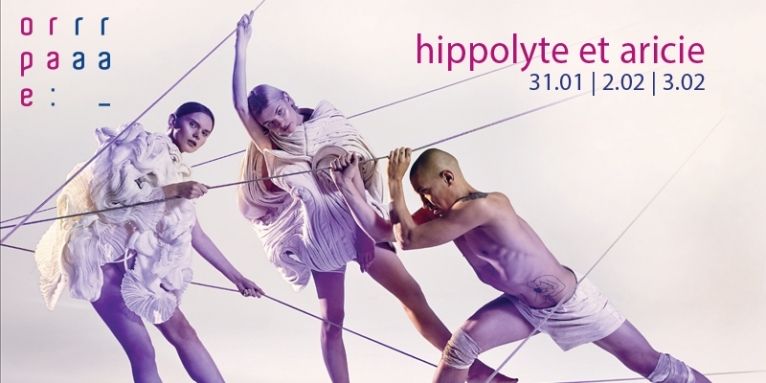 The objective of the Opera Rara Festival is to reprise and bring the greatest opera works to the public in the spirit of the epoch, featuring the most outstanding representatives of the historical performance world. It harkens back to the times when opera was fashionable, and considered to be a way to spend time in a pleasant way. The idea of enthralling the audience and moving their emotions in such a way dates back to the beginnings of the Baroque. The Opera Rara Festival will be inaugurated on Thursday, 31st of January at the ICE Kraków. In the 17th and 18th century, the opera did not comment on social status, did not deal with political issues and did not create psychological portraits. It was also not concerned with realism. The Baroque opera was a spectacular fairy tale for adults, which prominently featured stage effects and beautiful singing.
The objective of the Opera Rara Festival is to reprise and bring the greatest opera works to the public in the spirit of the epoch, featuring the most outstanding representatives of the historical performance world. It harkens back to the times when opera was fashionable, and considered to be a way to spend time in a pleasant way. The idea of enthralling the audience and moving their emotions in such a way dates back to the beginnings of the Baroque. The Opera Rara Festival will be inaugurated on Thursday, 31st of January at the ICE Kraków. In the 17th and 18th century, the opera did not comment on social status, did not deal with political issues and did not create psychological portraits. It was also not concerned with realism. The Baroque opera was a spectacular fairy tale for adults, which prominently featured stage effects and beautiful singing. Back to world stages
The course of almost two hundred years (1587-1740) was marked by the creation of about four hundred operas, half of which have survived to our times, and in recent decades only a few dozen of them were staged, recorded on stage, released on CDs or performed during concerts. This repertoire still features numerous works that await their discovery or reprisal – for their resurrection and a fresh, contemporary shape. One of the recently restored works is Hyppolyte et Aricie, a lyrical tragedy by Jean-Philippe Rameau (1683-1764). The legendary performance of this opera at the 1983 Aix-en-Province Festival was conducted by John Eliot Gardiner, the piece was also recorded by Marc Minkowski and Les Musiciens du Louvre (1995), as well as by Les Arts Florissants led by William Christie (1997). Hyppolyte et Aricie then had to wait for a return to the theatre stages until the 21st century, until the spectacular production by Palais Garnier (2012), followed by a performance at Glydenbourne Festival in the following year, and the premiere at Staatsoper Unter den Linden in Berlin – in 2018! This year, the opera will be presented to the French audiences at the Théâtre des Champs-Elysées, the Zurich Opera House and thanks to the Opera Rara Festival.
Love, revenge and plots of the gods of Olympus
Father Simon-Joseph Pellegrin wrote a libretto based on Jean Racine’s famous tragedy Phèdre, filled with references to Greek mythology, as well as the works by Euripides (Hippolitus) and Seneca (Phaedra). Theseus, a hero from Athens, wins the battle during which Aricia is captured. Due to the plot enacted by the god of love, Aricia develops feelings towards Hippolytus. The vicissitudes of fate also lead his stepmother Phaedra to fall in love with the young man. During Theseus’ long absence, convinced that her husband died, Phaedra confesses her love for Hippolytus. He rejects her, confessing that he loves Aricia and that she loves him back. In despair and overtaken by shame, Phaedra tries to fall on a sword, but Hippolytus takes away her weapon at the last second. The returning Theseus, misunderstanding the situation, curses his son and sends him and Aricia into exile. What will be the fate of the mythical lovers? Will their love break Theseus’ curse?
Rameau’s late debut
Hyppolyte et Aricie is Jean-Phillippe Rameau’s late debut as an opera composer. The piece was created in 1733, when the composer was already fifty years old. His stage works are distinguished by their masterful approach to instrumentation and his use of an orchestra, which he uses to depict events such as a storm on the sea or an earthquake, while instrumental accompaniment takes precedence over vocals. This is why the importance of Rameau for French instrumentation – rich and sensitive to tonal nuances – is often stressed and highlighted.
Hyppolyte et Aricie was considered to be a very divisive opera, both for the French audiences, as well as contemporary critics. Some were delighted to such an extent that they dubbed its author contemporary Orpheus, while others were surprised and even bewildered. Rameau became the author of the first work called considered to be Baroque because of its musical style.
Pillar of French tradition
Jean-Philippe Rameau became one of the main representatives of the French opera tradition – which is now brought back to life – together with Jean-Baptiste Lully. Despite the fact that in the Baroque, French opera was less popular than Italian music (which was met with reluctance of the French public), but today it is being discovered more and more. The performers involved in the resurrection of French stage works often regard their involvement as a mission to promote this rich repertoire. The Opera Rara Festival is also part of this mission, restoring the work of Jean-Philippe Rameau interpreted by Sjaron Minailo, musical experimental theatre director. What will be the result of an experiment combining modern technology and concept with the pillar of French tradition created nearly three hundred years ago? Will the work delight once more? Or maybe it will divide the audience again? Regardless of the outcome, it is definitely worth seeing for yourself.
For the Krakow Festival Office – Agnieszka Lakner, musicologist and ethnologist